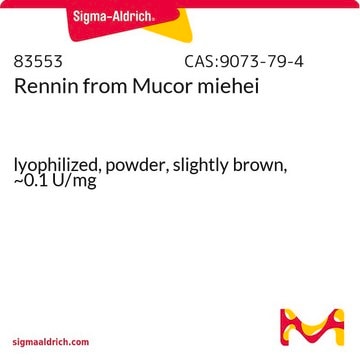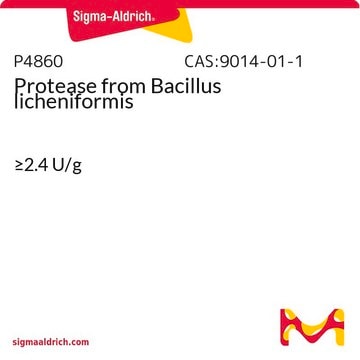R4877
Rennin from calf stomach
≥20 units/mg protein
Synonym(s):
Chymosin
Sign Into View Organizational & Contract Pricing
All Photos(1)
About This Item
Recommended Products
form
lyophilized powder
Quality Level
specific activity
≥20 units/mg protein
purified by
crystallization
composition
Protein, ≥40%
storage temp.
−20°C
Looking for similar products? Visit Product Comparison Guide
Application
Rennin, also known as chymosin, is a milkclotting acid proteinase produced in the stomach of a calf. It is used in cheesemaking and to study neonatal gastric digestion .
Biochem/physiol Actions
Rennin, a 323 amino acid chain, is secreted as an inactive precursor which is then converted into an active enzyme through limited proteolysis. It cleaves the peptide bond between phenylalanine and methionine in K-Casein.
Packaging
Package size based on protein content
Unit Definition
One unit will coagulate 10 mL of milk per min at 30 °C.
Physical form
Lyophilized powder containing sodium chloride
Analysis Note
Protein determined by biuret.
Signal Word
Danger
Hazard Statements
Precautionary Statements
Hazard Classifications
Eye Irrit. 2 - Resp. Sens. 1 - Skin Irrit. 2 - STOT SE 3
Target Organs
Respiratory system
Storage Class Code
11 - Combustible Solids
WGK
WGK 3
Certificates of Analysis (COA)
Search for Certificates of Analysis (COA) by entering the products Lot/Batch Number. Lot and Batch Numbers can be found on a product’s label following the words ‘Lot’ or ‘Batch’.
Already Own This Product?
Find documentation for the products that you have recently purchased in the Document Library.
Customers Also Viewed
Kirsten Kastberg Møller et al.
Journal of agricultural and food chemistry, 60(21), 5454-5460 (2012-05-09)
Bovine chymosin constitutes a traditional ingredient for enzymatic milk coagulation in cheese making, providing a strong clotting capacity and low general proteolytic activity. Recently, these properties were surpassed by camel chymosin, but the mechanistic difference behind their action is not
Neil D Rawlings et al.
Nucleic acids research, 40(Database issue), D343-D350 (2011-11-17)
Peptidases, their substrates and inhibitors are of great relevance to biology, medicine and biotechnology. The MEROPS database (http://merops.sanger.ac.uk) aims to fulfil the need for an integrated source of information about these. The database has hierarchical classifications in which homologous sets
Xin-ping Li et al.
Xi bao yu fen zi mian yi xue za zhi = Chinese journal of cellular and molecular immunology, 28(7), 715-717 (2012-07-10)
To optimize the prochymosin (pCHY) gene codons and express the gene in Escherichia coli (E.coli), and to prepare its antiserum and detect chymosin protein specifically. According to codon usage bias of E.coli, prochymosin gene sequence was synthesized based on the
Jung-Feng Hsieh et al.
Journal of agricultural and food chemistry, 60(8), 2039-2045 (2012-02-07)
Chymosin-induced coagulation of individual milk proteins during incubation at 30 °C was investigated using a proteomic approach. The addition of chymosin (0.006 units/mL) caused the milk proteins to coagulate after a 3 h incubation period. Approximately 88% of the milk
Filiz Kazak et al.
Veterinary research forum : an international quarterly journal, 13(4), 593-596 (2023-01-24)
Epidermal growth factor (EGF) has biological roles, including embryonic organ development, breast morphogenesis, breast cell proliferation, and mammary development. This study aimed to measure EGF concentration and evaluate its relationship with somatic cell count (SCC) in healthy water buffaloes (Bubalus
Our team of scientists has experience in all areas of research including Life Science, Material Science, Chemical Synthesis, Chromatography, Analytical and many others.
Contact Technical Service










